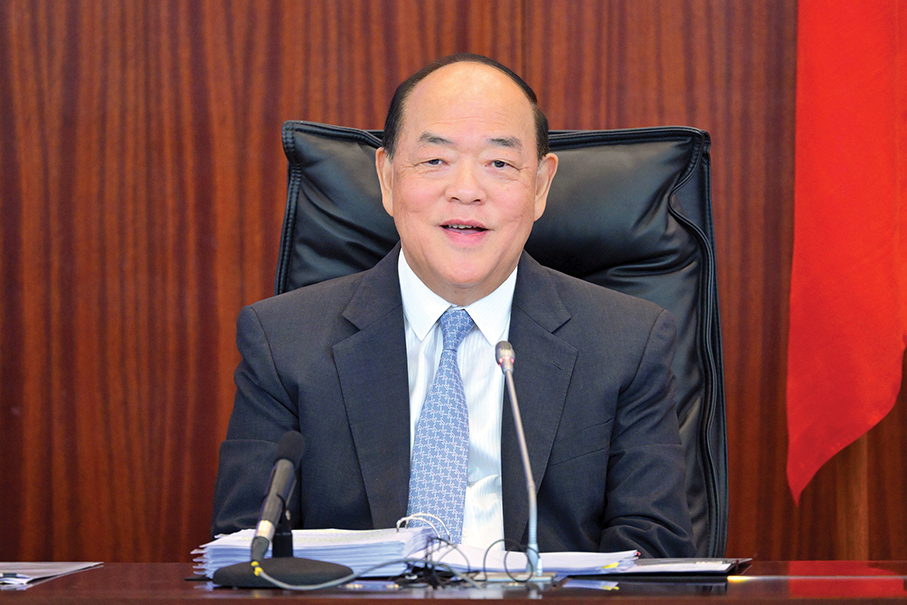Long-term consumption coupons ‘unhealthy’ for economy
Chief Executive Ho Iat Seng pledged yesterday that the government will continue to study the feasibility of rolling out new measures aiming to support “more strongly” the city’s small- and medium-sized enterprises (SMEs) later this year, coinciding with the 25th anniversary of Macau’s return to the motherland.
The Macau Special Administrative Region (MSAR) was established on December 20, 1999.
However, the chief executive also underlined that it would be “unhealthy” for Macau’s economy and businesses if the government did keep issuing e-consumption coupons “in the long term” with the aim of boosting local consumer spending.
Ho answered questions from 29 lawmakers during a Q&A session in the legislature’s hemicycle yesterday afternoon.
Including its president Kou Hoi In, the Legislative Assembly (AL) has 33 members. Yesterday’s 3.5-hour plenary session included a 30-minute break.
Lawmaker Wong Kit Cheng, a nurse by profession, said during yesterday’s Q&A session that the government’s ongoing e-coupon campaign for the peninsula’s northern district, which started last month, was boosting consumption there, asking Ho whether the government would consider launching the campaign for other districts later this year.
Ho said that his government was aware of Macau’s currently “unbalanced” consumption performances between tourism districts and other neighbourhoods.
Ho noted that the city’s tourism districts’ businesses were hard hit by the three-year COVID-19 pandemic from 2020 through 2022, while businesses in other neighbourhoods enjoyed a relatively good performance during the period. He acknowledged that the pandemic discouraged residents from crossing the Macau-Zhuhai border.
Ho said that since the post-pandemic economic recovery began early last year when all COVID-19 border curbs were lifted, Macau’s tourism districts have been enjoying a strong consumption performance, but businesses in other neighbourhoods have been “facing problems”.
Ho noted that across the city, the peninsula’s northern district is most affected by Macau’s currently relatively poor local consumption performance because it is convenient for residents living there to travel to Zhuhai to dine out and shop in the neighbouring city.
Consequently, Ho said, his government decided to launch an e-coupon consumption stimulation campaign for the northern district first. He said that the government would need to review whether this ongoing campaign is effective in boosting local consumption in the northern district (known in Cantonese as “bak koi”), before deciding whether to gradually roll out the campaign for other districts as well.
Ho rules out citywide coupon campaign
However, the chief executive ruled out the possibility of launching a citywide e-coupon consumption campaign. He noted that a possible citywide campaign would mean that e-coupons could also be used at shops in tourism districts, which are already outperforming their counterparts in other neighbourhoods. In which case, he said, businesses in other districts would not necessarily benefit from the issuing of e-coupons.
Ho underlined that it would be “unhealthy” for the city’s economy and businesses if the government did assume the main role in boosting consumption by issuing e-consumption coupons “every day”.
Ho said that relying solely on the government to support civil society by issuing e-consumption coupons would only generate temporary effects in boosting consumption. “This will be just a flash in the pan,” he said.
Ho also acknowledged that “many” businesspeople renting shops have been affected by the predicament where landlords began demanding a rent hike when renewing their leases after the start of the post-pandemic economic recovery early last year. Ho said he understands that landlords want to be paid higher rents as many of them bought their shop units when the city’s property price was high and they are still paying their mortgages.
The chief executive said that “such a predicament originated from the excessively high property prices previously resulting from speculation”.
Ho went on to say the situation showed that companies in the city’s financial sector “should comply with the bottom line when assessing mortgage-loan applications”.
Former horse racetrack
Meanwhile, Ho also said during yesterday’s Q&A session that in the long term the government plans to earmark the plot of land where the former horse racetrack in Taipa is located for multifunctional facilities used for sport, cultural and entertainment purposes.
The large site and its facilities in south-western Taipa reverted to the government on April 1 when the Macau Jockey Club’s horse-racing concession was prematurely terminated upon the company’s request.
Ho said yesterday that the government has now included the former horse racetrack’s plot as part of its long-term urban planning, adding that developing the area into multifunctional facilities used for sport, performances and other cultural activities could be expected to take 5 to 10 years. He noted that the area is near to central Taipa as well as to Cotai’s integrated resorts, because of which, he said, making good use of the area would be beneficial to Macau’s development and the population’s well-being.
Ho said that the government would study whether it needed to hire a highly-qualified international consultancy tasked with drawing up the plot’s urban planning, adding that this process would need to take one or two years.
Ho said the area would also include ice-skating rinks and an underground carpark. The chief executive reaffirmed that the plot would not be used for residential projects or casinos.
Ho noted that the plot is a very large one available for future development, amounting to around 300,000 square metres, pledging that the government will make the best use of the plot with the aim of maximising its positive effects on Macau’s development.
Meanwhile, Ho also said that the government was now aiming to find an open-air location in Taipa by the end of this year suitable for hosting concerts with a capacity of 50,000 spectators.

Chief Executive Ho Iat Seng answers questions from lawmakers during yesterday’s Q&A session in the Legislative Assembly’s (AL) hemicycle. – Photo: GCS







